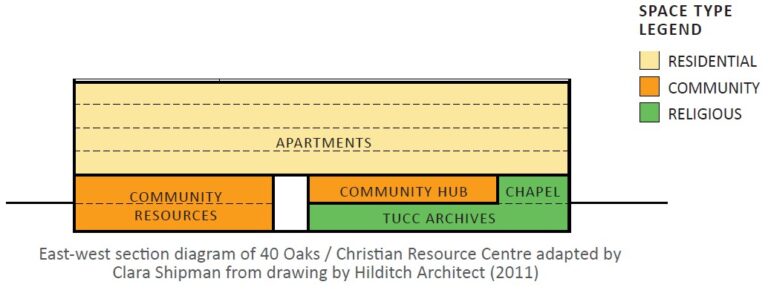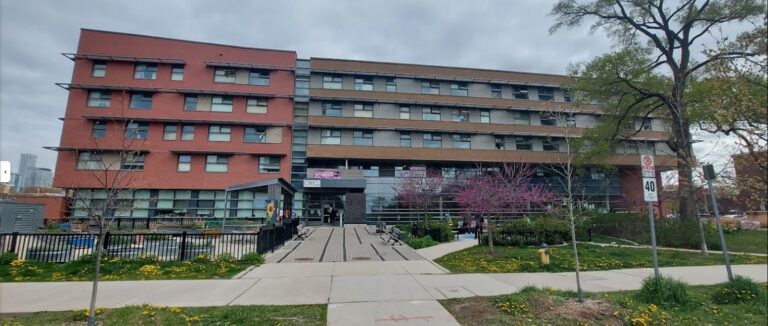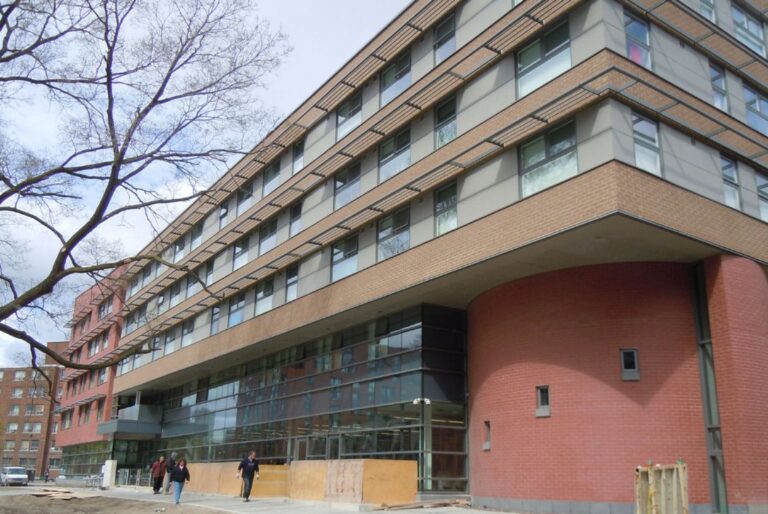40 Oaks / Christian Resource Centre
40 Oak Street, Toronto, Ontario
Type: New construction
Size: 10,000 + sf
Project Cost: $23 million
Development Partners:
- Toronto United Church Council
- Toronto Christian Resource Centre
- Toronto Community Housing Corporation
- City of Toronto
- Federal & Provincial Government
Status: Opened in 2012
Description
40 Oaks is a community hub for social services and grass roots organizations as well as an affordable housing initiative that was included in the first phase of the Regent Park redevelopment. The five-storey project includes 87 units of deeply affordable housing, a 5,000 square foot community hub where people can gather and participate in activities geared to their needs, offices, a commercial kitchen, a non-denominational chapel, a public park and a community food garden. It also houses the United Church of Canada archives. It is operated by the Toronto Christian Resource Centre (CRC).



Complexity / Collaboration
The CRC started as the social justice mission of members of Rosedale United Church. This property, where Regent Park United Church used to stand and located in the heart of Regent Park, has been leased to the CRC since 1952. It was one of only four properties not owned by the Toronto Community Housing Corporation (TCHC), all of them churches. From its beginning, the CRC delivered services and programs for Regent Park residents and the homeless. When the Regent Park revitalization plans got under way, a land swap was arranged with TCHC. CRC agreed to give up a portion of its land in exchange for a new site along the north edge of a new linear park. The church was subsequently demolished and 40 Oaks was built. The project required close collaboration between all partners and the community.
User Interaction/Partnership Framework
The CRC has a 50-year lease of the land, which is owned by the Toronto United Church Council. CRC runs programs in partnership with other agencies that joined to expand overall services. The housing component was originally managed by Dixon Hall. In terms of interface between the housing and social components, the project intended to provide a distinction between the residential area and the public services which the CRC has historically provided to the entire community. To do so they provided separate entrances to the residences on the and to the non-denominational chapel on the east side.
Costs / Funding
The United Church Council’s contribution of the land through a long term lease made it a viable project. The total capital cost for the construction of the 87-unit residential component of the building was approximately $13.5 million plus waived Development Charges and Fees. Funding contributions included Federal-Provincial Affordable Housing Program funding of $6 million, City funds from the Mayor’s Homelessness Initiative Reserve Fund of $1.4 million, CRC equity and financing of approximately $4.8 million, TCHC equity of almost $1 million, and waived City development charges and fees of approximately $600,000. Total cost for the building escalated to $23 million, with a large portion of the funding for the social component of the project contributed by the United Church. Some of the CRC’s operations funding comes through rent from the City of Toronto, but the majority comes from donations.
Questions?
If you’d like more details on our case studies, please contact us at infrastructure@utoronto.ca